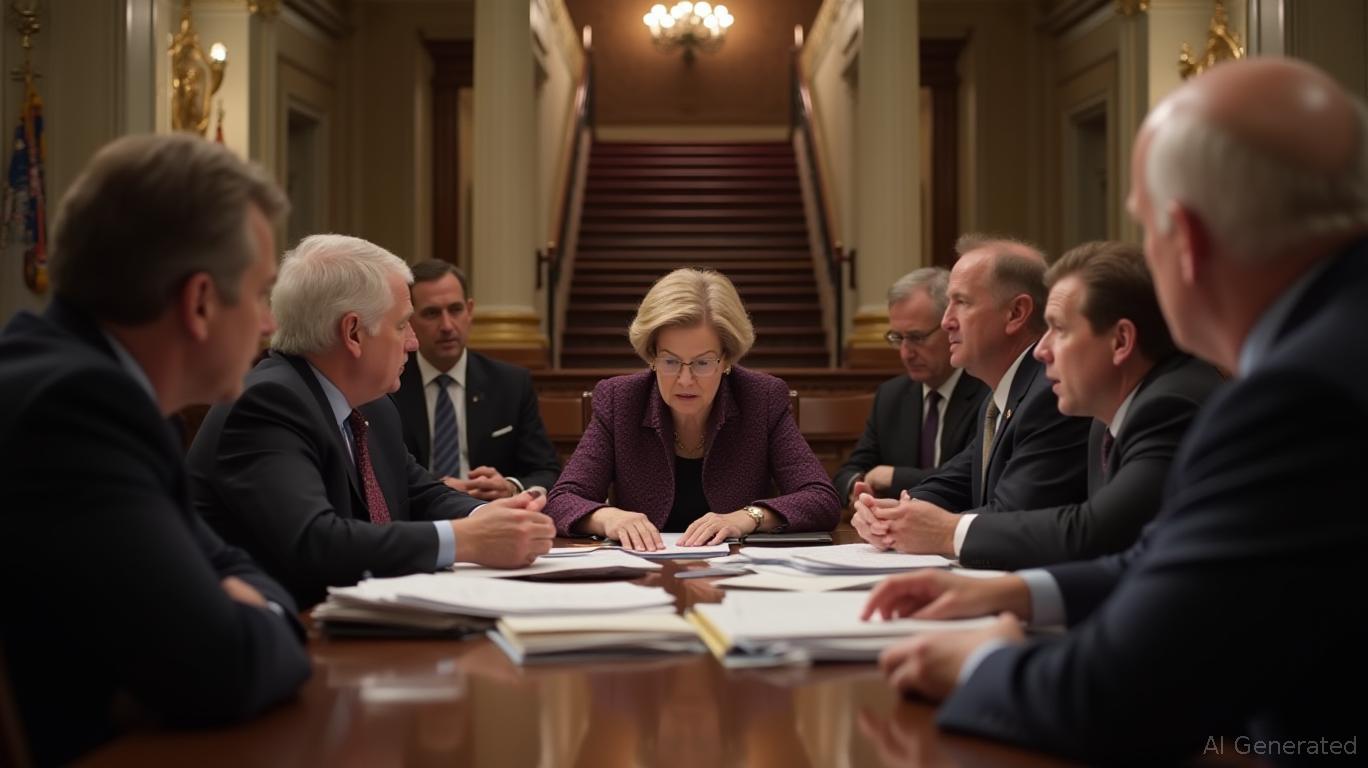Crypto Legislation Dispute: Democrats Focus on Trump’s Connections to Crypto, Republicans Emphasize Advancing Innovation
- Senate Democrats propose crypto bill targeting Trump's ties, emphasizing anti-corruption and SEC/CFTC clarity. - GOP's Responsible Financial Innovation Act prioritizes innovation, distinguishing securities vs. commodities. - Bipartisan efforts face hurdles over anti-corruption provisions, with House CLARITY Act adding complexity. - Industry urges unified regulation to maintain U.S. global competitiveness in digital finance.

Senate Democrats have presented a comprehensive blueprint for regulating the cryptocurrency market, directly contesting the Republican-led initiatives in the Senate Banking Committee. Backed by 12 Democratic senators, the proposal lays out seven foundational principles aimed at clarifying regulatory authority, strengthening consumer safeguards, and tackling issues related to unlawful finance and political misconduct. The plan stresses the necessity for a "robust, bipartisan resolution," recognizing the intricate task of defining the roles of the Securities and Exchange Commission (SEC) and the Commodity Futures Trading Commission (CFTC) in overseeing digital assets. This development follows Republican plans, spearheaded by Committee Chair Tim Scott, to advance their own market structure legislation by September 2025.
The Democrats' outline specifically urges the enactment of laws preventing officeholders and their relatives from financially benefiting from digital assets during their tenure, a measure responding to criticisms of President Donald Trump’s involvement in crypto projects. The framework also points out the CFTC’s limited resources for supervising crypto spot markets and encourages both regulatory bodies to craft updated oversight systems. Currently, the proposal lacks Republican backing in the Senate, although bipartisan negotiations continue. Republican Senator Cynthia Lummis, a principal contributor to the GOP plan, has voiced hope that both parties can merge their efforts on specific topics to reach a broad consensus.
The Republican draft, named the Responsible Financial Innovation Act of 2025, aims to define when digital assets should be classified as securities or commodities. It features a clause to ensure tokenized stocks are not considered commodities, addressing concerns with market structure. Lummis has mapped out a schedule for the Senate Banking Committee to vote on the SEC elements of the bill this month, with the Agriculture Committee to consider the CFTC-related aspects by October. Nonetheless, the GOP proposal still faces obstacles in attracting Democratic support, requiring at least seven Democratic senators for passage.
A major disagreement centers around the inclusion of anti-corruption measures. The Democratic plan openly accuses Trump of leveraging digital asset ventures for personal and family gain, potentially complicating bipartisan talks. While the GENIUS Act—a stablecoin legislation passed in July—omitted such provisions, the Democrats’ renewed focus on political accountability could revive debates over reconciling regulatory oversight with innovation. The situation is further complicated by Trump’s connections to crypto initiatives like
Recent actions suggest progress in narrowing partisan gaps. The Senate moved the GENIUS Act forward with a 66–32 bipartisan vote after senators including Mark Warner (D-Va.) and Cynthia Lummis (R-Wyo.) agreed on amendments that addressed Democratic concerns regarding consumer protection and ethical standards. The revisions impose restrictions on tech firms issuing stablecoins and expand ethics rules to include certain government employees, temporarily impacting individuals like Elon Musk. However, some critics believe the agreement falls short in confronting Trump’s crypto activities, with Senator Elizabeth Warren cautioning that "fundamental problems remain unresolved."
The outlook for comprehensive crypto regulation remains unclear. While Republicans are pushing to enact the Responsible Financial Innovation Act by the end of the year, the House is considering its own CLARITY Act, aimed at resolving jurisdictional conflicts between the SEC and CFTC. The CLARITY Act, introduced by Rep. French Hill (R-Ark.), proposes a national licensing system for crypto businesses and affirms the CFTC’s control over digital commodity spot markets. However, aligning the Senate and House measures, along with the GENIUS Act, will not be easy.
Both industry leaders and lawmakers agree that establishing clear rules for the crypto sector is urgent. Patrick Witt, the newly appointed White House crypto advisor, has highlighted the critical need for bipartisan cooperation to enact market structure reforms. With the Senate Banking Committee preparing to review the SEC section of the GOP proposal this month and the House having already passed the CLARITY Act, the next few months will be crucial for Congress to find common ground on crypto policy. Failing to do so could cause the U.S. to lag in the global competition to define the future of digital finance.
Disclaimer: The content of this article solely reflects the author's opinion and does not represent the platform in any capacity. This article is not intended to serve as a reference for making investment decisions.
You may also like
Bitget donates HK$12 million to support fire rescue and reconstruction efforts in Tai Po, Hong Kong
Bitget Spot Margin Announcement on Suspension of ELX/USDT Margin Trading Services
Enjoy perks for new grid traders and receive dual rewards totaling 150 USDT
Bitget Spot Margin Announcement on Suspension of BEAM/USDT, ZEREBRO/USDT, AVAIL/USDT, HIPPO/USDT, ORBS/USDT Margin Trading Services